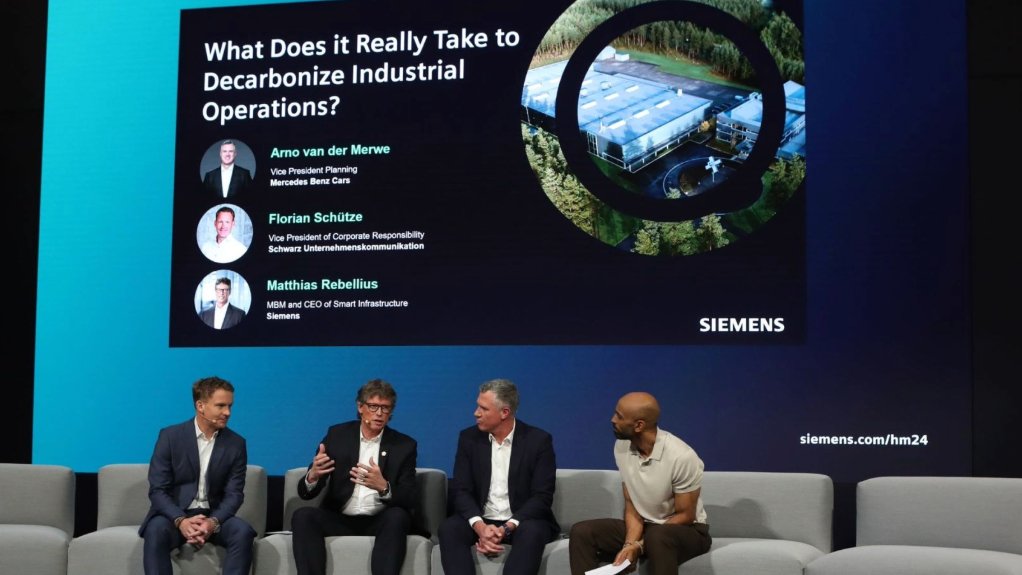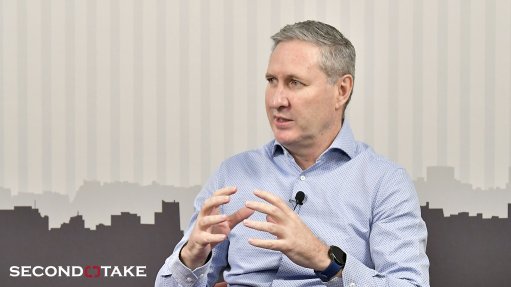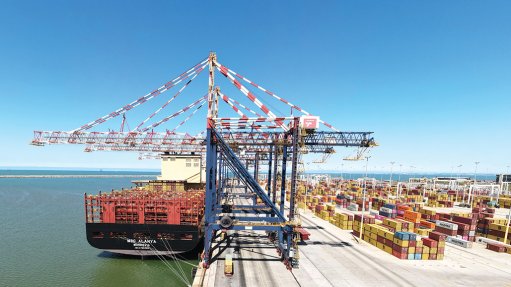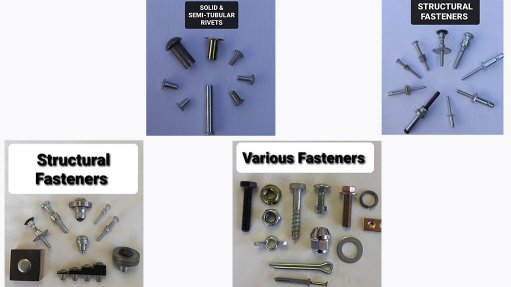Decarbonising industrial operations requires concerted effort


From left to right are Schwarz Unternehmenskommunikation corporate responsibility VP Florian Schütze, Siemens managing board member and Siemens Smart Infrastructure CEO Matthias Rebellius, Mercedes-Benz planning VP Arno van der Merwe and moderator Chris Brow in discussion at the Hannover Messe 2024 expo.
Decarbonisation requires comprehensive and multifaceted approaches and standardised processes across various industries. It should involve mobilising an organisation, managing information flow, digitising operations to manage the complexity of the circular economy and decarbonising supply chains to reach net zero.
These were the views shared by Siemens managing board member and Siemens Smart Infrastructure CEO Matthias Rebellius, Mercedes-Benz planning VP Arno van der Merwe and Schwarz Unternehmenskommunikation corporate responsibility VP Florion Shütze, in a panel discussion on strategies necessary to decarbonise industrial operations, at the international Hannover Messe 2024 expo, in late April, in Hannover, Germany.
Rebellius said energy decarbonisation was well understood by industry, as indicated in Siemens' Infrastructure and Transmission Monitor survey. “We asked customers and stakeholders about how far they thought we were in terms of our net-zero targets and the majority said we are not on track, and that is concerning.”
Van Der Merwe reiterated that decarbonisation was a complex topic, but stressed that setting reasonable targets was a good starting point.
“For an organisation like ours, we have to understand our demand profiles, the source of the issues arising, prioritising the setting of very clear targets, something we have to reinforce through the entire organisation,” he added.
“It's about creating institutional organisational structure, knowing what you want to achieve, what your targets are, understanding what the biggest issues are, how to deal with those issues and taking a comprehensive approach,” he elaborated.
Shütze, meanwhile, asserted that industry's decarbonisation efforts were gaining momentum but that there was still a long way to go. “Looking at the global economy and the big players in the industry, only about a third of them have science-based targets. However, we are short of two-thirds of those who follow a clear plan on decarbonising their operations and their supply chain to push the industry to the tipping point on net zero.”
DIGITILISATION
He further explained that digitalisation was a necessary component in operations owing to decarbonisation’s complex nature. He said the Schwartz Group had a complex ecosystem of businesses, such as Calphalon Lidl – the retail arm of the group, Shwartz Digital and Shwartz Production – one of the biggest food items producers in Germany.
“Collaboration between these companies provides the [group] with unique opportunities in closing the loops, exchanging data and best practices on decarbonising our operations, as well as supporting thousands of our suppliers in closing in on their net-zero targets and decreasing our footprint,” he elaborated.
He alluded to an initiative the Shwartz Group had undertaken in the retail sector to recycle and reproduce every plastic bottle it initially produces, demonstrating the benefits of taking advantage of the circular economy.
“The circular economy is one of the vital aspects necessary in reducing our footprint and avoiding linear economics; however, digitalisation is necessary for exchanging and making things happen,” Shütze added.
Rebellius echoed Shütze’s sentiments, adding that recycling and reproducing the plastic bottles, then scaling up the operations to millions, replicating this process across various cities and countries, would result in the kind of impact needed to reach net zero by 2050.
“It’s a process that takes a lot of collaboration internally, data security and something that will take many years for the cycle to close,” said Shütze.
Van der Merwe added that complexities increased further down the supply chain and that each supplier needed to have the same ambition for the entire network in order for the target to be achieved.
CHALLENGES
Rebellius explained that one of the challenges in decarbonisation was managing the number of suppliers needed for operations, adding that the biggest proportion of emissions came from the upstream supply chain – thus Scope 3 emissions.
He pointed out that decarbonising only one's own on-site operations was not enough and that finding and selecting the right suppliers and convincing them to buy into the same vision and supporting them was essential in achieving the scale of emissions reductions needed to reach net zero.
“Decarbonisation has an investment and cost element to it and many corporations would see that as an obstacle, but I think it is an opportunity to decarbonise organisational strategy, which eventually opens up plenty of technological opportunities,” Van der Merwe stressed.
He added that companies with complex manufacturing environments should incorporate various power sources such as photovoltaics and geothermal plants - energy sources Mercedes Benz is already using. Currently the firm is looking at how to store this energy and how to scale its storage for various usage profiles and using technology to merge all the complicated systems.
Rebellius says Siemens was optimistic about emerging technologies and how the company would deploy them. He highlighted that Siemens would be pioneering in the area of getting a comprehensive set of data from across the entire lifecycle and including circularity.
“Digitalisation requires standardization - if you have a standardised model and the same set of data, you can work together more seamlessly,” he added.
“I believe we’re on the brink of real progress and real savings. For example, in energy-intensive processes, we are successfully using artificial intelligence to make predictions, make decisions on how machine parameters should be set and we are getting up to 20% energy reduction in a classical paint type of oven process,” said Van der Merwe.
GREAT ECONOMIC OPPORTUNITIES
In closing, Van der Merwe said that decarbonisation brought about business and economic opportunities and a future that was more independent of traditional energy sources.
The pathway to decarbonisation was clear and needed to be turned into a business case, by developing a clear strategy, avoiding the burning of fossil energies, reducing energy consumption as much as possible, and recycling and reusing as much as possible, said Shütze.
Reduction in energy consumption, resource sufficiency and energy efficiency in industries would definitely be a big catalyst to decarbonising industries. Companies were not hesitant about investing in decarbonising operations out of fear, but rather from concerns about which investments were suitable for the company, because investing had to make ecologic and economic sense, Rebellius concluded.
Comments
Press Office
Announcements
What's On
Subscribe to improve your user experience...
Option 1 (equivalent of R125 a month):
Receive a weekly copy of Creamer Media's Engineering News & Mining Weekly magazine
(print copy for those in South Africa and e-magazine for those outside of South Africa)
Receive daily email newsletters
Access to full search results
Access archive of magazine back copies
Access to Projects in Progress
Access to ONE Research Report of your choice in PDF format
Option 2 (equivalent of R375 a month):
All benefits from Option 1
PLUS
Access to Creamer Media's Research Channel Africa for ALL Research Reports, in PDF format, on various industrial and mining sectors
including Electricity; Water; Energy Transition; Hydrogen; Roads, Rail and Ports; Coal; Gold; Platinum; Battery Metals; etc.
Already a subscriber?
Forgotten your password?
Receive weekly copy of Creamer Media's Engineering News & Mining Weekly magazine (print copy for those in South Africa and e-magazine for those outside of South Africa)
➕
Recieve daily email newsletters
➕
Access to full search results
➕
Access archive of magazine back copies
➕
Access to Projects in Progress
➕
Access to ONE Research Report of your choice in PDF format
RESEARCH CHANNEL AFRICA
R4500 (equivalent of R375 a month)
SUBSCRIBEAll benefits from Option 1
➕
Access to Creamer Media's Research Channel Africa for ALL Research Reports on various industrial and mining sectors, in PDF format, including on:
Electricity
➕
Water
➕
Energy Transition
➕
Hydrogen
➕
Roads, Rail and Ports
➕
Coal
➕
Gold
➕
Platinum
➕
Battery Metals
➕
etc.
Receive all benefits from Option 1 or Option 2 delivered to numerous people at your company
➕
Multiple User names and Passwords for simultaneous log-ins
➕
Intranet integration access to all in your organisation



















